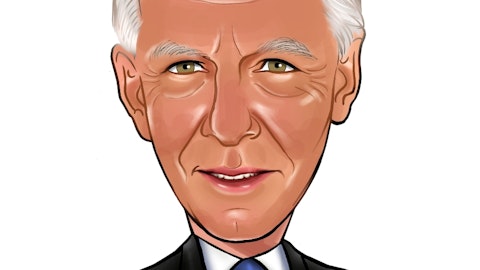Peter Lynch, an investment guru who managed to generate returns of 29% per annum during his 13 years at the helm of Fidelity Magellan, once said that “Insiders might sell their shares for any number of reasons, but they buy them for only one: they think the price will rise”. But one question still remains unanswered: are insiders’ purchases on the open market outperforming broader market benchmarks? The simple fact that insiders believe the share price of a stock will rise does not necessarily mean that the stock will actually appreciate over time. However, much research suggests that officers and directors are experts at trading their companies’ securities, with their purchases beating benchmarks by a wide margin. Recent academic research also shows that they are skilled at trading other stocks in their industry, which shows both how vast and valuable their industry knowledge and experience is. With that in mind, Insider Monkey examined dozens of Form 4 filings submitted with the SEC on Monday and pinned down three companies with the most noteworthy insider purchases.
Academic research has shown that certain insider purchases historically outperformed the market by an average of seven percentage points per year. This effect is more pronounced in small-cap stocks. Another exception is the small-cap stock picks of hedge funds. Our research has shown that imitating the 15 most popular small-cap stocks among hedge funds outperformed the market by nearly a percentage point per month between 1999 and 2012 (read more details here).
This REIT’s CEO Keeps Buying Shares
Ryman Hospitality Properties Inc. (REIT) (NYSE:RHP) is one of the three companies with notable insider buying amid relatively weak insider trading activity of late, though it has started to gain steam over the past several trading sessions. Chairman and Chief Executive Officer Colin V. Reed bought 7,400 shares on Friday for $52.53 each. Mr. Reed owns a direct ownership stake of 1.02 million shares, which includes 525,912 shares credited to his supplemental executive retirement plan (SERP) account. Each of the latter group of shares has the economic equivalent of one share and are payable exclusively in shares of common stock following termination of employment.
Ryman Hospitality Properties Inc. (REIT) (NYSE:RHP) operates as a real estate investment trust (REIT) whose owned assets include four upscale, meetings-focused resorts with 7,795 rooms managed by lodging operator Marriott International Inc. (NASDAQ:MAR) under the Gaylord Hotels brand. The REIT’s total revenue for 2015 reached $1.09 billion, up from $1.04 billion in 2014. The increase was mainly driven by an increase of $40.4 million in revenue from the Hospitality segment, as well as an increase of $10.7 million in revenue generated by the Entertainment segment. It should be noted as well that the REIT’s total revenue per available room (Total RevPAR) increased to $303.45 in 2015 from $296.09 in 2014 and $267.24 in 2013.
Shares of Ryman Hospitality Properties are up by nearly 1% year-to-date, after gaining 19% in the past three months. The REIT intends to pay out an annual dividend of $3.00 per share in 2016, which implies an attractive dividend yield of 5.75%. There were 17 hedge fund vehicles tracked by Insider Monkey with stakes in the REIT at the end of 2015, which amassed approximately 17% of the company’s outstanding common stock. Bernard Selz’s Selz Capital reported owning 257,400 shares of Ryman Hospitality Properties Inc. (REIT) (NYSE:RHP) as of March 31.
Follow Ryman Hospitality Properties Inc. (NYSE:RHP)
Follow Ryman Hospitality Properties Inc. (NYSE:RHP)
Receive real-time insider trading and news alerts
Let’s head to the next two pages of this daily insider trading article, where we will discuss the Form 4 filings submitted by insiders at Porter Bancorp Inc. (NASDAQ:PBIB) and Monsanto Company (NYSE:MON).
Three Insiders Helped Porter Bancorp Avoid Default
Porter Bancorp Inc. (NASDAQ:PBIB) had three different insiders buy massive blocks of shares this past week, which is the kind of insider trading activity investors should pay close attention to. To start with, President and Chief Executive Officer John T. Taylor bought 250,000 shares on Friday at $1.25 apiece, boosting his ownership to 675,000 shares. Moreover, Director Bradford T. Ray also purchased 250,000 units of common stock on Friday for $1.25 each, which lifted his overall holding to 303,148 shares. Last but not least, James M. Parsons, another member of the company’s Board, snapped up 100,000 shares on Friday at the same price tag of $1.25 per share, after which Mr. Parsons holds a stake of 106,350 shares. All of these shares were purchased in a private placement of common stock through which the company issued 2.9 million common shares and 1.1 million non-voting common shares. The private placement generated total proceeds of $5.0 million, of which $2.8 million was used to make interest payments and bring current the company’s trust preferred securities.
In 2011, Porter Bancorp entered into a consent order with the Federal Deposit Insurance Corporation (FDIC) and the Kentucky Department of Financial Institutions (KDFI), agreeing to obtain written consent from both agencies before declaring or paying any dividends. The consent order established benchmarks for the bank to improve asset quality, and reduce loan concentrations, among other things. As a result, Porter Bancorp started deferring interest payments on the junior subordinated notes related to its trust preferred securities in late 2011. However, if Porter defers interest payments on those trust preferred securities for 20 consecutive quarters, the company must either pay all deferred interest or default. Therefore, the aforementioned private placement enabled the company to avoid a possible default.
Porter Bancorp is a Kentucky-based bank holding company that operates one of the largest banks in the Commonwealth of Kentucky through wholly-owned subsidiary PBI Bank. The company operates 15 banking offices in 12 counties in Kentucky. The bank’s Tier 1 leverage ratio improved to 6.08% from 6.01% year-over-year during the final quarter of 2015 and the total risk-based capital ratio improved to 10.58% from 10.50%, but both measures remained below the minimums of 9.0% and 12.0% required by the aforementioned consent order. Nonetheless, the company’s management and Board continues to implement necessary steps to meet the requirements of the consent order, which may eventually enable the bank to pay dividends again. Shares of Porter Bancorp are up by 58% in the past 52 weeks and are 2% in the green thus far in 2016. George Hall’s Clinton Group had 512,819 shares of Porter Bancorp Inc. (NASDAQ:PBIB) in its equity portfolio at the end of 2015.
Follow Limestone Bancorp Inc. (NASDAQ:LMST)
Follow Limestone Bancorp Inc. (NASDAQ:LMST)
Receive real-time insider trading and news alerts
Insider Buying Seen at Monsanto For the First Time in More Than 5 Years
Monsanto Company (NYSE:MON) had not witnessed any insider buying activity since the end of 2010 until last week. Director Charles S. McMillan purchased 3,500 shares last Tuesday at prices that ranged from $87.10 to $87.35 per share, lifting his overall holding to 58,440 shares. The last time Mr. McMillan bought shares was exactly six years ago, when he purchased 2,000 units of common stock for $67.26 each. The shares of the provider of agricultural products have declined by 24% in the past 12 months, which probably serves as the primary reason behind Mr. McMillan’s recent purchase.
Monsanto Company markets seeds, biotechnology trait products, herbicides and digital agriculture tools that allow farmers to improve productivity and reduce the costs of farming. Monsanto conducts its business operations through two segments: Seed and Genomics; and Agricultural Productivity. The Seeds and Genomics segment includes the global seed and other related traits businesses, biotechnology platforms, and digital agriculture. Through the Agricultural Productivity segment, Monsanto manufactures Roundup and Harness brand herbicides, as well as other herbicides. The company’s net sales for the first half of fiscal year 2016 that ended February 29 totaled $6.75 billion, a 16% year-over-year decline. The decrease was mainly driven by weaker demand in the agricultural productivity segment, as well as in corn and soybean seed and traits. The decrease in agricultural productivity was attributable to lower volume of sales and lower average net selling price of Roundup and other glyphosate-based herbicides. The aforementioned two segments were also severely impacted by foreign currency headwinds, especially in Brazil. Net income for the first half of fiscal year 2016 was $1.80 per share, down from $3.41 per share in the first half of fiscal year 2015.
Some analysts believe that most market participants and investors are focused too much on Monsanto’s short-term challenges, which include falling crop prices, competitor discounting, devaluations of certain currencies and depressed glyphosate prices. However, the company’s growth is anticipated to speed up in the foreseeable future should crop prices, global currencies, and glyphosate pricing stabilize.
Shares of Monsanto currently change hands at around 16.2-times expected earnings, below the forward P/E multiple of 18.5 for the S&P 500 Index and the ratio of 20.1 for competitor Syngenta AG (ADR) (NYSE:SYT). The hedge fund sentiment towards Monsanto Company declined significantly during the December quarter, as the number of funds with stakes in the company dropped to 38 from 60 quarter-over-quarter. Murray Stahl’s Horizon Asset Management owns 12,324 shares of Monsanto Company (NYSE:MON) as of March 31.
Follow Monsanto Co W (NASDAQ:MON)
Follow Monsanto Co W (NASDAQ:MON)
Receive real-time insider trading and news alerts
Disclosure: None




